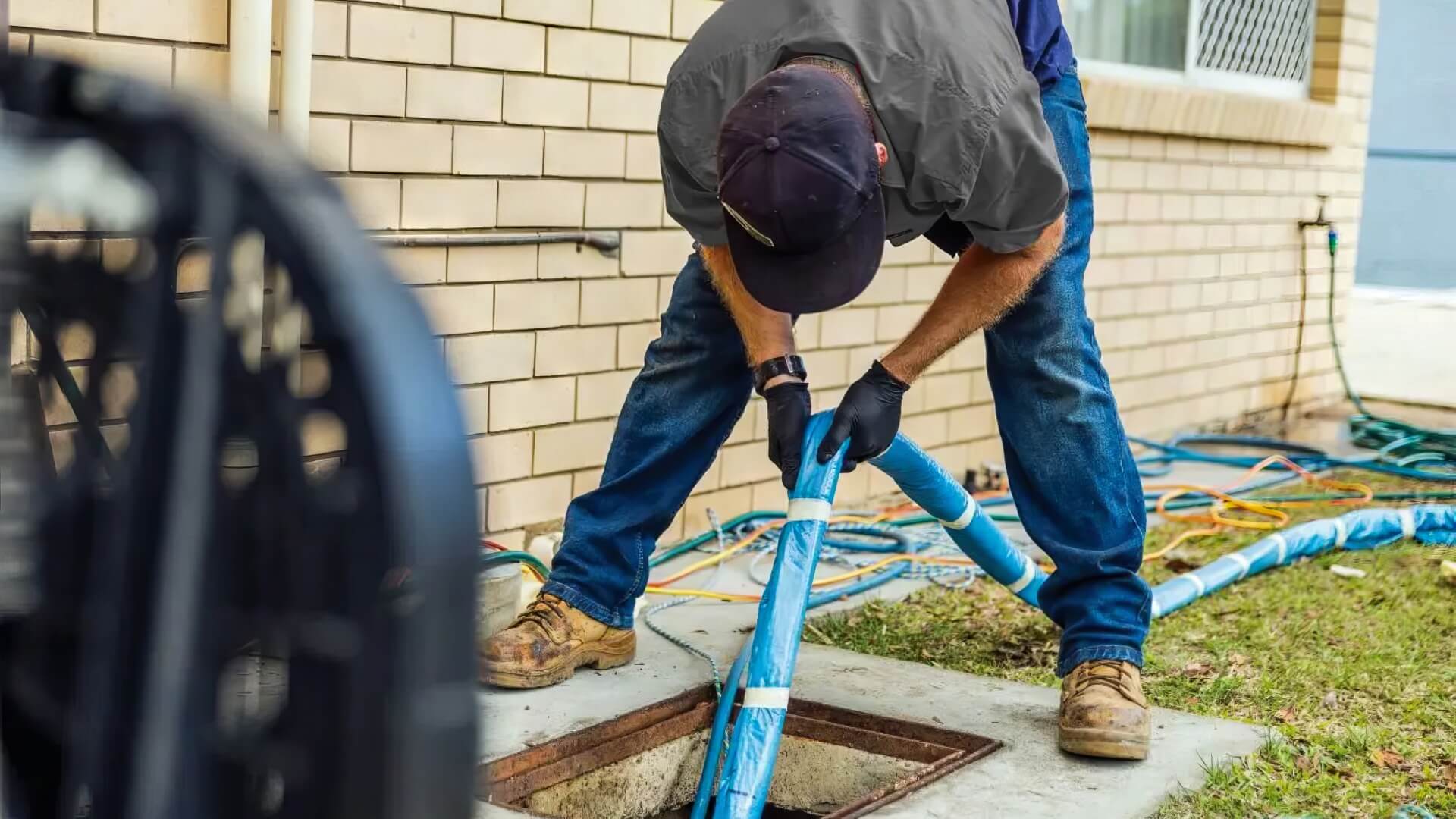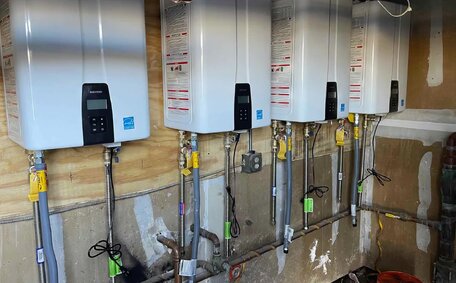Introduction: The Link Between Drain Blockages and Water Pressure
Blocked drains can lead to reduced water pressure and potential water leaks, adversely affecting your home and that of your neighbours. Accumulations of debris and grease in the pipes can compromise wastewater flow and diminish essential water pressure, potentially resulting in plumbing issues.
Back pressure from blockages, frequently due to high water pressure, can disrupt the entry of fresh water into your home. This is because the blockage causes a back pressure that hinders incoming clean water. As a consequence, clogged drains can lead to pressure problems, resulting in drops of water supply to your fixtures, including faucets, showers, and appliances spread throughout the house.
Addressing a clogged drain promptly is crucial to restoring and maintaining steady water flow in your home. If a clogged drain is left unchecked, it could eventually cut off water flow entirely, depriving your home of usable water.
Signs That a Drain Blockage is Affecting Water Pressure
- Diminished water flow from faucets and shower heads may indicate underlying plumbing problems
- Toilets that are slow to refill or don’t refill completely after flushing, a common issue resolved by local plumbers
- Gurgling sounds from all drains, pipes, or sewer vents
- Pooling water in sinks, tubs, or around your shower drain
- Foul sewage odours coming from drains or vents
- Excessive buildup of water pressure can risk bursting pipes, which may result in significant leaks.
- Such pressure issues can cause complete loss of water flow to parts or all of your home.
- Difficulty running multiple water fixtures or appliances at once
- Unexpected fluctuations in all your hot water system temperatures
- Irregularities on your water meter that result in elevated water bills should prompt you to consult your water supplier or assess the pressure regulator
Clogged Fixtures Causing Reduced Flow
Clogs in individual fixtures, such as sink faucets and toilets, or issues with your stop tap, can lead to low water pressure in your taps. Mineral buildup, rust, soap scum, and hair clumps are common culprits in blocked sewer line issues.
Signs of an isolated clogged fixture include:
- Greatly reduced flow from a single faucet or shower head compared to others
- Cloudy, discoloured water from one tap while others remain clear
- Toilets that flush slowly or weakly, potentially indicating a need to fix water flow problems
For isolated issues with only a few fixtures, ensure the shutoff valve is fully open and check for normal flow elsewhere to pinpoint a localised clog. Fixing a localised clog typically involves disassembling and cleaning the affected fixture.
Persistent low water flow across your home’s taps and appliances may signal serious issues, including clogged sewer lines, sewer vents, or disruption in the main water line, which could affect water pressure.
Backed Up Drains and Gurgling Sounds
Backed-up drains frequently produce gurgling sounds due to trapped air bubbles, which can impact your home’s water pressure. This happens when you encounter slow water drainage, as wastewater cannot flow properly and can also lead to accumulation inside the pipes.
As the backed up water fills the pipes, Displaced air rising through the system may potentially affect your home’s water pressure. The displacing water pushes the trapped air up, creating gurgling or burbling noises, prompting you to check your water and ensure no air is entrapped in the drain traps. You may detect these sounds emanating from roof vents, sink drains or even your sewer lines.
Gurgling sounds indicate partial blockages that are beginning to impede wastewater flow through your water pipe. But it typically means your plumbing system is still functioning and water can pass through, albeit much slower.
Heeding the warning of gurgling sounds in drains is crucial; our skilled team is ready to address these issues with efficiency and promptness. It’s a clear sign your drains need attention and cleaning.
It’s essential to manage partial clogs promptly, lest they evolve into a problem your plumbing system must combat as soon as possible. Clearing obstructions early on prevents them from hardening and becoming more difficult to remove.
For gurgling drains, it’s advisable to promptly engage a professional to safeguard your main water supply’s integrity. Often, a plunger, drain auger, or homemade drain cleaner can effectively remove clogs and resolve gurgling issues.
Causes of Drain Blockages That Impact Water Pressure
Numerous factors can cause drain blockages that lead to reduced water pressure:
- Grease, oil, hair, and food waste can accumulate in drain pipes, potentially becoming a nexus for blockages over time. As deposits build up in the interior of pipes your plumbing system has, they narrow the diameter, impede water flow, and can result in significant leaks.
- Tree roots infiltrating your sewer line can cause leaks and severe blockages, leading to complications over time. The roots create a dense mesh that ensnares debris, which can ultimately lead to substantial leaks and blockages in your water pipes.
- Collapsed drain pipes - Older pipes made from clay or metal corrode and eventually collapse inward, greatly reducing flow.
- Foreign objects, such as toys, utensils, or inadvertently flushed cleaning supplies, can get lodged and cause a clog, affecting water pressure.
- Improper plumbing pitch or sagging - Incorrect installation or shifting foundations over time can lead to areas where stagnant water pools and debris accumulates, which can cause low water flow, affecting the system.
- Rust and mineral deposits - Iron, calcium, and other minerals slowly build up on pipe walls, reducing the opening for wastewater to drain.
As these obstructions grow, the effects blocked drains have become more apparent, causing low water pressure, with the restriction impeding the flow as it attempts to exit your home. Subsequently, the accumulated wastewater creates pressure your homes clean water supplies must wrestle. This resistance to flow can cause a drop in water pressure, troubling household drains and impacting fixtures throughout.
Catching and clearing drain blockages early is crucial to mitigate your low water pressure and avoid broader impacts. Neglected clogged drains can completely obstruct wastewater flow, escalating to serious issues like sewage backups and intensifying low water pressure.
DIY Solutions for Minor Drain Clogs
Understand the impact of minor drain clogs, which, while common, have not yet led to extensive backups or completely obstructed flow. Here are some tips to help clear obstructions:
- Baking Soda and Vinegar - Mix 1 cup of baking soda with 1 cup of vinegar and pour it into the blocked drain. Cover tightly for 5-10 minutes as the reaction bubbles away grease and debris before flushing with hot water.
- Boiling Water - Carefully pour a full kettle of hot water down the drain as your local plumber might advise, to clear the blockage. The heat may dissolve grease that could cause blockage, while the volume of water can dislodge existing debris.
- Plunger - Use a heavy-duty sink plunger over the drain for several plunging strokes toapply force to the clog and loosen it.
- Drain Snake - Feed a metal drain auger 6-10 feet down the pipe manually or with a power drill to hook, grab and extract built-up debris.
- Salt and Baking Soda - Mix 1/2 cup salt with 1 cup baking soda and 1/2 cup vinegar, then pour into drain and flush with 6 cups boiling hot water after 10-15 minutes.
If drains remain sluggish, engaging a licensed plumber for professional intervention is advisable, as high-pressure water jetters can effectively tackle tough blockages.
When to Call a Professional Plumber
For homeowners grappling with drain clogs, it’s critical to know when to seek a professional plumber’s help. If your DIY efforts to clear minor clogs have failed, or the clogs are causing sewage backups, low water pressure, or loss of water flow, immediate expert help is needed.
Specifically, make your move and contact Colyton Plumbing for help on 1300 349 338 or at jobs@colytonplumbingservices.com.au if you’re experiencing a water pressure cause such as low pressure in any of the following circumstances:
- - Complete losses of water flow to parts or your entire home
- - Sewage backflows from toilets, tubs, blocked shower drains, or basins
- - Visible sewage flooding caused by issues with your main sewer line inside or outside the home
- - A sewer drain blockage that defies correction with household drain snakes
- - Significantly reduced your water pressure that persists even after repeated attempts at drain plunging
- - Foul sewage odours that persist despite DIY drain cleaning methods
- - Gurgling sounds from multiple drains or fixtures after attempting to clear them
- - Leaking water pipes might signal a time to suspect water leak, potentially caused by excessive drain-related water pressure
If DIY methods cannot resolve backed up drains, leaks, loss of water pressure/flow or sewage overflows, professional equipment and expertise is essential.
Contact your local trusted Colyton Plumbing as soon as possible when confronted with significant plumbing crises, ongoing drain clogs, sewage backflows, or dwindling water pressure at home. We provide 24/7 emergency plumbing services to homes throughout Colyton and greater Sydney.
Preventing Future Drain Blockages
Homeowners can take several effective steps to prevent future drain clogs and blockages:
- Installing drain screens or covers can prevent hair and debris from entering your pipes and causing clogs.
- Route downpipes away from the base of your home to protect the integrity of your drainage system - Ensure that roof gutters and downpipes channel rainwater well away to prevent it from seeping into your home, thwarting soil erosion and foundational damage.
- Clean fixtures regularly - Routinely scrub away your buildup inside sinks, tiles and showerheads to clear soap scum, hair and grime before it enters drain openings.
- Don’t pour fats/oils down drain - Allow cooked fats, oils and greases to fully solidify then dispose in the garbage rather than rinsing down the sink to avoid coating pipes.
- Use enzyme drain cleaners monthly - Active enzymes can easily break down organic matter, keeping pipe walls clear of substances that might otherwise cling and build up.
- Install water-efficient fixtures - Employing low-flow shower heads and faucet aerators can ease the burden on your household drains, promoting faster water flow that prevents settling.
A licensed plumber can offer professional drain inspections using pipe cameras to identify developing clogs before they become more severe. We can then perform preventative pipe cleaning if needed to keep your drains free-flowing.
Contact us today on 1300 349 338 or jobs@colytonplumbingservices.com.au to learn more about our full range of drain maintenance services.






